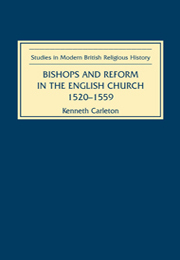Book contents
- Frontmatter
- Contents
- List of Illustrations
- Dedication
- List of Abbreviations
- Acknowledgements
- Introduction
- 1 Theologies of Episcopacy in mid-Tudor England
- 2 Models of Episcopal Office
- 3 Bishops of the English Church, 1520–1559
- 4 The Bishop and Preaching
- 5 Bishops and the Provision of Education
- 6 Prayer and Sacrifice: the Life of the Bishop
- 7 Episcopal Activity I: the Eradication of Heresy
- 8 Episcopal Activity II: the Propagation of the Ministry
- 9 Conclusion: the Old Episcopate in a New Order
- Appendix I Prosopography of the bishops in office, 1520–1559
- Appendix II The dioceses
- Appendix III The education of the bishops
- Appendix IV The bishops of Sodor and Man
- Bibliography
- Index of Scriptural References
- General Index
5 - Bishops and the Provision of Education
Published online by Cambridge University Press: 12 September 2012
- Frontmatter
- Contents
- List of Illustrations
- Dedication
- List of Abbreviations
- Acknowledgements
- Introduction
- 1 Theologies of Episcopacy in mid-Tudor England
- 2 Models of Episcopal Office
- 3 Bishops of the English Church, 1520–1559
- 4 The Bishop and Preaching
- 5 Bishops and the Provision of Education
- 6 Prayer and Sacrifice: the Life of the Bishop
- 7 Episcopal Activity I: the Eradication of Heresy
- 8 Episcopal Activity II: the Propagation of the Ministry
- 9 Conclusion: the Old Episcopate in a New Order
- Appendix I Prosopography of the bishops in office, 1520–1559
- Appendix II The dioceses
- Appendix III The education of the bishops
- Appendix IV The bishops of Sodor and Man
- Bibliography
- Index of Scriptural References
- General Index
Summary
If the bishops were to be the prime movers in the preaching of the Word in their dioceses, they needed to be supported by a learned and educated body of clergy equipped fully for the task. The educational shortcomings of the clergy were a source of almost universal concern amongst the early reformers, in England as much as on the Continent. In 1528 William Tyndale complained of the English clergy that
they wot no more what the New or Old Testament meaneth, than do the Turks: neither know they of any more than that they read at mass, matins, and evensong, which yet they understand not: … a great part of them do understand no Latin at all, but sing, and say, and patter all day, with the lips only, that which the heart understandeth not.
The bishops were not unaware of the failings of their clergy in this matter. A concern for education as an essential component of the episcopal office was derived from the idea of the bishop as the first and foremost preacher in his diocese. Many bishops sought to improve clerical education for the express purpose of raising the standard of preaching in the Church, there was no conception of an integrated training programme for priesthood as a whole at the end of the Middle Ages. Until the idea of the seminary was first proposed by Cardinal Pole, the main (and only formal) school of ministerial training was the university; Oxford and Cambridge received a number of endowments in the years preceding 1520 to the end that they might perform this task more effectively.
- Type
- Chapter
- Information
- Bishops and Reform in the English Church, 1520–1559 , pp. 99 - 116Publisher: Boydell & BrewerPrint publication year: 2001



